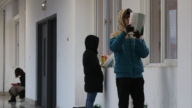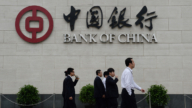【新唐人2011年12月15日讯】近期大陆房地产市场交易量陷入长时间低迷,房地产价格持续下降,当局对房地产调控的成败,攸关明年中国经济是否“硬着陆”的宏观命题,持续的楼市调控,对正在下滑的中国经济无异是雪上加霜,如稍有放松又可能会让持续20个月的调控功亏一篑。2012年房地产政策走向牵动中国百姓的神经。
根据中国房地产指数系统12月1号公布的数据,全中国百城价格指数的全样本数据显示,2011年11月,全国100个城市住宅平均价格为每平方米8,832元,与10月相比下降0.28%,连续第3个月环比下降,且降幅有所扩大。
房价飙升,百姓自然怨声载道,威胁社会安定。但房价跌得快,杀伤力可能更大,因为这场房地产调控的成败已经不只是关乎行业自身,而且攸关明年中国经济是否“硬着陆”的宏观命题。
杰森:“因为整个中国经济就是三辆马车——出口、投资、加上内需,中国的内需和投资换句话说都最后变成房地产上了,出口,明年因为欧洲和美国经济不会立刻复苏,所以说整个出口增长速度持续9个月下降,也就是说房市就成了它的救命稻草了。三辆马车,出口这辆肯定不行,而投资和内需这两辆马车,全挂在房地产这辆马上了。”
其次,在房地产下跌的背后,牵引的是中国实体经济下滑,地方财政紧张。有越来越多的人预期,房地产政策将出现松动。
杰森:“明年,是不是中共就会放宽对房地产的控制﹖这个呢,很有可能!明年,牵扯到中共政治换届的问题,换届过程中,下届政府肯定不愿意背一个…再次被充大的房地产的泡沫,所以在政治权衡下,很可能房地产政策还会处在一种要放松不松、要紧不紧的这种犹豫的状态,使得整个房地产市场,处于一种飘忽不定的状态。”
资料显示,2010年的房地产投资,在国内生产总值(GDP)中的直接比重超过12%。不过,房地产还影响40至50个左右的关联产业,包括水泥、钢材、玻璃、家俱电器以及装饰材料等等,还有就业。
房地产还攸关金融业的安全,尽管中国前银监会主席刘明康在房贷压力测试后,曾乐观的表示,“房价下跌40%银行抗得住”,但资料却不乐观,截至2010年底,全中国主要金融机构房地产类贷款的比重超过20%,银行贷款已占房地产开发资金的70%。
近期已有部分商业银行指出,银行和房企能够承受房价下跌20%-30%带来的冲击,但银行和企业更加关心房价下跌20%后会不会诱发恐慌性抛售﹖抛售现象出现后,有关方面能否采取有效措施控制连锁反应﹖一连串的问题都显示:2012年房地产走势将巨幅影响中国经济的兴衰。
新唐人记者常春、林平、黎安安采访报导。
2012 Real Estate Policy Vital to China’s Economy
。
China’s recent real estate transactions present long-term
downturns, and housing prices continue to drop.
The Chinese Communist Party (CCP) authorities’regulation
of real estate has become a vital factor in determining
if China’s economy will suffer a hard landing in 2012.
The sustained regulation on the real estate market has
worsened the declining economy,
and at the same time a slight ease up may make
the 20-month’s of regulation efforts been done in vain.
The CCP regime’s 2012 real estate policy
makes Chinese civilians worry.
The China Real Estate Index System released data
on December 1, showing that
during November the average price sampled from 100 cities
in China was at RMB 8,832 (USD $1,386) per square meter, down by 0.28% from October.
This is a fall for the third consecutive month,
with a larger decrease.
While soaring housing prices might naturally incite unrest
among the populace, and threaten social stability,
housing prices’plunging may be more destructive.
The issue of regulating real estate has not only influenced
the sector in and of itself,
but has also become a vital factor in determining
if China’s economy will suffer a hard landing in 2012.
NTDTV Commentator, Jason Ma: “The three major driving
forces for China’s economy are: exports, investment and domestic demand.
Now in reality, both China’s domestic demand and investment
have been hung up on the real estate.
In 2012, the economy in Europe and the U.S.
won’t recover immediately.
While in China, the export growth rate has continued
to drop for nine months.
In other words, the real estate has become its lifesaver.
That is to say, among these three major drivers,
exports definitely fail,
and both the investment and the domestic demand
are tethered to the real estate."
Again, the decline in the real estate pulled down China’s
actual economy, causing local financial constraints.
More and more people forecast that an easing real estate
policy will be implemented.
NTDTV Commentator, Jason Ma: “Will the CCP regime
ease the control over the property next year? Most likely!
Next year the CCP authorities will have personnel change
for new-term government,
which is certainly unwilling to be burdened
with a recharged real estate bubble.
So after weighing in politics, the real estate policy will probably
be in hesitation between easing and tight control.
That’ll put the entire property sector into a state of uncertainty."
Data shows that real estate investment in 2010 accounted
for over 12% of GDP value.
However, the real estate also affects 40 – 50 related industries,
including cement, steel, glass, furniture, appliances and decorative materials, as well as employment.
Real estate is also relevant to the safety of the financial sector.
Although the former Chairman of China Banking Regulatory
Commission Liu Mingkang, optimistically claimed,
“40% housing price drop will still keep China’s Banks
from making losses."
However, the actual data does not reflect such optimism.
By the end of 2010, real estate loans accounted for
over 20% in loans of major financial institutions in China.
70% of the real estate develops funds come from the bank loans.
Some commercial banks recently pointed out that
banks and the real estate developers can withstand the hit
brought by a 20%-30% drop in housing prices.
However, are the banks and other enterprises concerned
with whether or not the 20% drop in housing price would induce panic selling?
And after the occurrence of sell-off, would the authorities
be able to take effective measures to control the chain reaction?
A series of questions indicate that the moving trend of
the real estate in 2012 will produce huge impact on China’s economic rise or fall.
NTD reporters Chang Chun, Lin Ping and Li Anan.




























